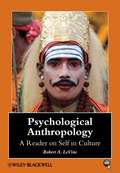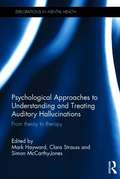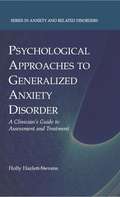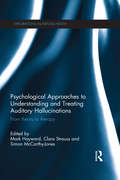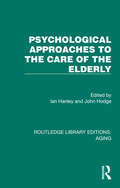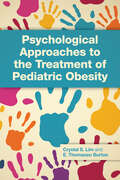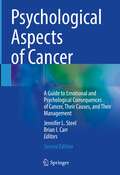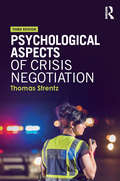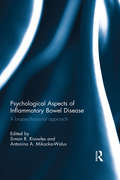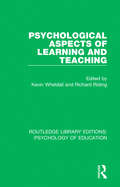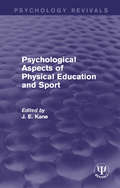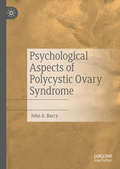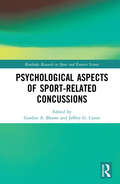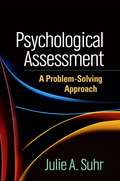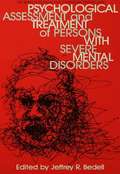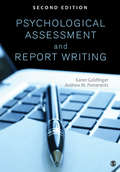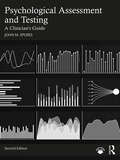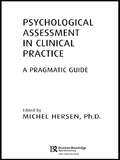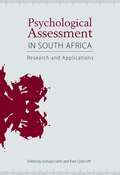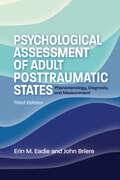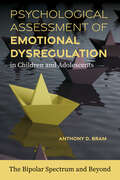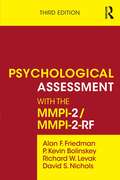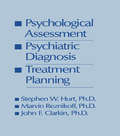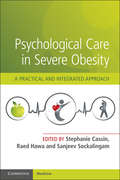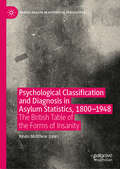- Table View
- List View
Psychological Anthropology: A Reader on Self in Culture
by Robert A. LevineDrawing from some of the most significant scholarly work of the 19th and 20th centuries, the Blackwell Anthologies in Social and Cultural Anthropology series offers a comprehensive and unique perspective on the ever-changing field of anthropology. It represents both a collection of classic readers and an exciting challenge to the norms that have shaped this discipline over the past century.
Psychological Approaches To Understanding And Treating Auditory Hallucinations: From Theory To Therapy
by Simon Mccarthy-Jones Mark Hayward Clara StraussThis book draws on clinical research findings from the last three decades to offer a review of current psychological theories and therapeutic approaches to understanding and treating auditory hallucinations, addressing key methodological issues that need to be considered in evaluating interventions. Mark Hayward, Clara Strauss and Simon McCarthy-Jones present a historical narrative on lessons learnt, the evolution of evidence bases, and an agenda for the future. The text also provides a critique of varying therapeutic techniques, enabling practice and treatment decisions to be grounded in a balanced view of differing approaches. Chapters cover topics including: behavioural and coping approaches cognitive models of voice hearing the role of self-esteem and identity acceptance-based and mindfulness approaches interpersonal theory. Psychological Approaches to Understanding and Treating Auditory Hallucinations brings together and evaluates diffuse literature in an accessible and objective manner, making it a valuable resource for clinical researchers and postgraduate students. It will also be of significant interest to academic and clinical psychologists working within the field of psychotic experiences.
Psychological Approaches to Generalized Anxiety Disorder
by Holly Hazlett-StevensConcise, yet without skimping on information, this book reviews current theory and research, addresses important diagnostic issues, and provides salient details in a number of key areas related to GAD. Assessment procedures and treatment planning are covered, along with the latest therapy outcome data, including findings on newer therapies. Also detailed are specific cognitive behavioral therapy techniques, including cognitive strategies, psychoeducation, and anxiety monitoring.
Psychological Approaches to Understanding and Treating Auditory Hallucinations: From theory to therapy (Explorations in Mental Health)
by Mark Hayward Clara Strauss Simon McCarthy-JonesThis book draws on clinical research findings from the last three decades to offer a review of current psychological theories and therapeutic approaches to understanding and treating auditory hallucinations, addressing key methodological issues that need to be considered in evaluating interventions. Mark Hayward, Clara Strauss and Simon McCarthy-Jones present a historical narrative on lessons learnt, the evolution of evidence bases, and an agenda for the future. The text also provides a critique of varying therapeutic techniques, enabling practice and treatment decisions to be grounded in a balanced view of differing approaches. Chapters cover topics including: behavioural and coping approaches cognitive models of voice hearing the role of self-esteem and identity acceptance-based and mindfulness approaches interpersonal theory. Psychological Approaches to Understanding and Treating Auditory Hallucinations brings together and evaluates diffuse literature in an accessible and objective manner, making it a valuable resource for clinical researchers and postgraduate students. It will also be of significant interest to academic and clinical psychologists working within the field of psychotic experiences.
Psychological Approaches to the Care of the Elderly (Routledge Library Editions: Aging)
by John Hodge Ian HanleyOriginally published in 1984, the overall purpose of this book was to provide ideas and suggestions about the usefulness of applied psychology in dealing with some of the problems of the elderly.
Psychological Approaches to the Treatment of Pediatric Obesity
by Dr. Crystal Stack Lim Dr. Elvin Thomaseo BurtonThis book offers a comprehensive review of current research and theoretical approaches to pediatric obesity. Pediatric obesity is a significant public health concern that currently affects 1 in 5 children and adolescents. Prevention and treatment of this complex health condition requires a multifaceted approach that acknowledges the intersecting roles of gender, race and ethnicity, socioeconomic status, and other factors that play key roles in the onset and maintenance of pediatric obesity. Written for mental health clinicians, as well as medical practitioners such as physicians, nurses, dietitians, and exercise physiologists who care for children and adolescents, this helpful resource offers a comprehensive review of current research and theoretical approaches, as well as clear descriptions of effective strategies to prevent and treat pediatric obesity. Through a lens of diversity, equity, and inclusion, the authors incorporate cutting edge research and their extensive clinical experience and expertise as they review evidence-based treatments that can be incorporated into various settings, including primary care, mental health, and specialty medical care clinics as well as schools and community organizations. With a special focus on psychological factors, including mental health conditions that frequently co-occur with pediatric obesity, this book incorporates case examples, treatment guidelines, and reproducible handouts to make addressing pediatric obesity more accessible to clinicians and practitioners.
Psychological Aspects of Cancer: A Guide to Emotional and Psychological Consequences of Cancer, Their Causes, and Their Management
by Brian I. Carr Jennifer L. SteelThis book addresses the unmet needs of the medical community in dealing with the psychological problems, particularly anxiety and depression, of patients diagnosed with cancer. Providing a scholarly review of the impact of cancer diagnosis on patients’ emotional and psychological status, as well as the evidence that psychological factors impact cancer occurrence and biological behavior, this book explores the therapeutic implications of such converse dynamics. Chapters review financial toxicity, eHealth, palliative care, mindfulness, sleep and cancer, social support and cancer, cultural diversity, pediatric and adolescent oncology, and geriatric oncology. While intended primarily for the professional readership of oncologists, psychologists, psychiatrists, social workers, and palliative care physicians, a final chapter also provides practical information on available resources for patients. This fully updated and expanded new edition of Psychological Aspects of Cancer: A Guide to Emotional and Psychological Consequences of Cancer, Their Causes, and Their Management provides practitioners with cutting edge knowledge as well as practical information that translates into better care for patients with cancer.
Psychological Aspects of Crisis Negotiation
by Thomas StrentzPsychological Aspects of Crisis Negotiation, Third Edition, explores the methods and strategies for confronting the nine types of subjects typically encountered in hostage/suicide sieges by correctional staff and law enforcement crisis negotiators. Strentz, an experienced negotiator who designed and directed the FBI’s hostage negotiator program, lays out the critical elements that are required for a successful encounter with a hostage taker or other malfeasant. This book highlights psychological dynamics of negotiations as they apply to the negotiator, the hostage, and the subject. It discusses the predictors of surrender versus the need for a tactical intervention and examines the phases of a hostage crisis and the changing focus as the crisis develops. Referencing historical events such as the Bay of Pigs invasion and the Challenger and Columbia incidents, this text demonstrates how faulty group decision making can spell tragedy. Enhanced with case studies to put the material into context, this third edition also includes new chapters on the SWAT team/crisis negotiator interface and on the genesis of the increased incidence of mentally ill hostage takers. Based on decades of experience in the fi eld and practical advice from a national expert, this volume arms negotiators with the knowledge and tools they need to defuse crises and increase the odds that hostages will survive.
Psychological Aspects of Inflammatory Bowel Disease: A biopsychosocial approach
by Simon R. Knowles Antonina A. Mikocka-WalusIn the Western world around 360 in every 100,000 individuals have inflammatory bowel disease (IBD), a relapsing-remitting autoimmune disease that affects the gastrointestinal tract. Its impact on individual functioning across physical and psychosocial domains is significant and psychological distress is a common feature, with research suggesting that active IBD is associated with one of the highest rates of depression and anxiety of all chronic illnesses. Despite the high prevalence of mental health co-morbidities in IBD, psychological illness remains largely undertreated, with studies showing that 60% of IBD patients experiencing mental health problems do not receive adequate help. In this book, Knowles and Mikocka-Walus bring together world experts who practice integrated and holistic approach in their care for IBD patients, to provide an overview of research across a range of topics associated with the biopsychosocial treatment of IBD. Each chapter provides an up-to-date comprehensive consolidation and evaluation of the current literature alongside recommendations for practice. Key themes include: current understanding of the interrelationship of the neurological and biological aspects of IBD common concerns and issues individuals with IBD face exploring challenges across individual life-stages current evidence for psychosocial interventions recommendations for future directions of biopsychosocial work. Psychological Aspects of Inflammatory Bowel Disease: A biopsychosocial approach is a key resource for researchers, practitioners and academics considering psychosocial aspects of the disease and psychological interventions. It will also appeal to health psychologists and mental health practitioners working with clients with IBD, as well as gastroenterologists interested in a comprehensive and holistic approach to IBD management.
Psychological Aspects of Learning and Teaching (Routledge Library Editions: Psychology of Education)
by Richard Riding Kevin WheldallEducational psychology has much to offer teachers and trainee teachers which can be of help to them in their work. In this book, originally published in 1983, leading experts look at a number of important topics in educational psychology. The chapters present detailed overviews of these key issues, survey recent research findings and advances in the subject at the time, and discuss innovative techniques and approaches which are particularly relevant for classroom practice. This book, much needed at the time, will still be extremely useful to mature teachers and to all students of educational psychology.
Psychological Aspects of Physical Education and Sport (Psychology Revivals)
by J. E. KanePsychology has an important part to play in the teaching and practice of physical education and sport, and this volume, originally published in 1972, provided a systematic and authoritative introduction to the major areas in this field at the time. The contributors, leading experts in the UK and US, cover five major areas of psychology: perception, learning, personality, motivation and emotion, focusing attention on important current research of the time, and opening up these areas for the serious student. They review controversial issues of central importance in physical education and sport, pointing to practical implications for learning, teaching and coaching. A great opportunity to read an early take on what has become a central part of physical education and sport today.
Psychological Aspects of Polycystic Ovary Syndrome
by John A. BarryThis book provides an overview of the latest knowledge of the psychological aspects of polycystic ovary syndrome (PCOS), and paves the way for advances in this rapidly evolving field. Taking an evidence-based approach, the book elucidates the ways in which PCOS causes anxiety and depression, impacts Quality of Life (QoL), and is associated with other psychological issues. The psychological impact of key features of PCOS are explored too, with a special focus on insulin resistance / diabetes, and fertility issues. The book concludes with a chapter on practical recommendations on how best to help with anxiety and depression in PCOS. An important feature of this book is its identification of the ways in which testosterone, a defining characteristic of PCOS, impacts psychology. In doing so it fills a lacunae in current research and offers evidence that maps out the complex ways in which biology impacts psychology in PCOS, and also how psychology can be harnessed to impact biology in a positive way. It will appeal in particular to scholars and clinicians in the fields of health psychology and women’s health.
Psychological Aspects of Sport-Related Concussions (Routledge Research in Sport and Exercise Science)
by Gordon A. Bloom Jeffrey G. CaronRecognition of concussion as a serious injury, informed by neurological and physiological research, is now commonplace in sport. However, research on the psychology of concussive injury—its psychological implications and outcomes, and psychological interventions for prevention and recovery—has largely been overlooked. This is the first book to explicitly and authoritatively set out the psychological aspects of sport-related concussion from a multidisciplinary and global perspective <P><P>The book attempts to offer a global understanding of the injury by presenting an historical overview; exploring the psychological implications of sport-related concussion and the influence of gender and sociocultural context on concussive injury and recovery; setting out practical guidance on working with special populations suffering from concussive injuries; and discussing the theoretical and methodological considerations for research on concussion and future directions for this research. <P><P>Written by a group of leading international experts and offering a hitherto underdeveloped perspective on this crucial area of sports injury research, this book is crucial reading for any upper-level student, researcher, sport scientist, coach, or allied health professional working on sport-related concussion. It is also valuable reading for students and researchers interested in the psychosocial processes that impact injury and recovery or general professional practice in sport psychology.
Psychological Assessment
by Julie A. SuhrThis authoritative clinical reference and text provides a complete guide to conducting empirically based assessments to support accurate diagnoses and better clinical care. The book builds crucial skills for gathering and interpreting data for specific assessment purposes. It also presents more advanced ways to integrate information from tests, interviews, observations, and other sources, within a biopsychosocial framework that fully addresses the needs of each client. Particular attention is given to accounting for potential biases that affect every stage of the decision-making process. User-friendly features include case examples, advice on writing reports and giving feedback to clients, and a detailed sample report.
Psychological Assessment And Treatment Of Persons With Severe Mental disorders (The\series In Clinical And Community Psychology)
by Jeffrey R. BedellFirst published in 1994. Until recently, patients with severe and long-lasting mental disorders were treated primarily through hospitalisation and psychotropic medication. However, now there is a concerted effort to integrate treatment approaches from behavioural and rehabilitation therapies and social skills training.; This book presents an integration of psychological treatment and assessment practices, authored by professionals with established expertise in their subject area. Topics of fundamentally important issues have been selected and divided into three sections: assessment and treatment planning; social and vocational skills development; and group and family therapy in rehabilitation. This volume can be used as a reference handbook, a guide to clinical practice, or a classroom text describing the basic psychological approaches that are effective with patients with severe mental disabilities.
Psychological Assessment and Report Writing
by Andrew M. Pomerantz Karen B. GoldfingerOutlining a step-by-step assessment model, Psychological Assessment and Report Writing, Second Edition covers five key topics central to psychological assessment: understanding the context of a referral; determining what data is needed to answer referral questions; gathering the data; integrating the data; and communicating the findings. Authors Karen Goldfinger and Andrew M. Pomerantz review each facet of psychological assessment and report writing—providing how-to instructions and alerting readers to a myriad of issues they must consider when conducting assessments in clinical, forensic, or educational environments. Filled with varied case examples that promote interest and meet instructional requirements, including one detailed case study that recurs throughout multiple chapters, the book uses sidebars and question and answer sections to encourage readers to consider their own case material and use critical thinking skills as they review each section of the model.
Psychological Assessment and Testing: A Clinician's Guide
by John M. SporesExpanding upon and updating the first edition, this comprehensive guide instructs readers on how to effectively conduct psychological assessment and testing in their practice, efficiently advancing a case from the initial referral and clinical interview, through the testing process, and leading to informed diagnosis and treatment recommendations. This second edition incorporates updated editions of all major tests, pertinent revisions from the DSM-5, more in-depth analysis of testing topics, and coverage of new constructs that are the targets of psychological testing relevant to outpatient mental health practice. Readers will learn about the fundamentals of assessment, testing, and psychological measurement, the complete process of psychological testing using a broad range of major tests, supplemented by interpretive flowcharts and case examples.. Downloadable practice and report forms, along with data tables with pre-drafted interpretive excerpts for all tests are also available for immediate use in clinical practice. Psychologists in both practice and training will come away with the tools and knowledge needed to successfully conduct psychological assessment and testing within the contemporary mental health field.
Psychological Assessment in Clinical Practice: A Pragmatic Guide
by Michel HersenThere have been numerous books published that have dealt with psychological assessment. These books have ranged from the theoretical to the clinical. However, most of the pragmatics involved in the day-to-day activities of the psychological assessor often have been neglected in the press. In light of the above, the primary objective of Psychological Assessment in Clinical Practice is to provide the reader(students and practitioners alike) with the realities of conducting psychological assessment in clinical settings where there is not the availability of a plethora of research assistants and staff. Indeed, most individuals end up being solo practitioners or at best work in settings where they must conduct assessment themselves. This multi-authored book, then, details the specifics as to how this is done.
Psychological Assessment in South Africa: Research and applications
by Sumaya Laher and Kate CockcroftThis book provides an overview of the research related to psychological assessment across South Africa.The thirty-six chapters provide a combination of psychometric theory and practical assessment applications in order to combine the currently disparate research that has been conducted locally in this field. Existing South African texts on psychological assessment are predominantly academic textbooks that explain psychometric theory and provide brief descriptions of a few testing instruments. Psychological Assessment in South Africa provides in-depth coverage of a range of areas within the broad field of psychological assessment, including research conducted with various psychological instruments. The chapters critically interrogate the current Eurocentric and Western cultural hegemonic practices that dominate the field of psychological assessment. The book therefore has the potential to function both as an academic text for graduate students, as well as a specialist resource for professionals, including psychologists, psychometrists, remedial teachers and human resource practitioners.
Psychological Assessment of Adult Posttraumatic States: Phenomenology, Diagnosis, and Measurement
by John Briere Erin EadieThis book presents a detailed yet practical summary of the major issues and instruments involved in the assessment of posttraumatic disturbances. Aligns with APA Divisions 38 and 50. Drs. Eadie and Briere analyze the types of traumas most likely to produce long-term difficulties, and explain the biological, historical, social, and cultural factors that mediate between trauma and long-term outcome. This fully-updated new edition combines extensive research on traumatic events, including rape, stalking, sex trafficking, torture, terrorist attacks, motor vehicle accidents, and natural disasters, along with new material on complex traumas, parental disattunement and emotional neglect, drug-facilitated sexual assault, sex trafficking, pregnancy loss, COVID-19-related stressors, and exposure to social maltreatment. Especially relevant to the clinician, researcher, and forensic specialist, this book reviews the available research on standardized measures currently available for evaluating the impact of trauma, with a close evaluation of the psychometric characteristics of each instrument. A comprehensive review of new trauma-relevant measures is provided, with an emphasis on direct clinical relevance to the assessment of posttraumatic states.
Psychological Assessment of Emotional Dysregulation in Children and Adolescents: The Bipolar Spectrum and Beyond
by Anthony D. BramThis book explains the process by which assessment psychologists can evaluate and report the nature and severity of emotional dysregulation in their young patients. As referrals for clinical assessment of complex children and adolescents frequently involve questions about emotional regulation in general and the possibility of bipolar spectrum conditions in particular, trainees and practitioners will find this to be an invaluable resource. Challenges with emotional regulation are common among patients of all ages who are referred for formal psychological assessment. Understanding the nature and severity of such challenges is crucial if evaluators are to make accurate formulations and develop meaningful treatment implications. This book will illuminate the process by which an assessment psychologist evaluates and reports the nature of emotional dysregulation. It will also serve as a reference book to tailor test batteries, interpret findings related to differential diagnosis, and link test findings with meaningful treatment implications. Topics explored include detailed case examples addressing real-world referral questions, challenges around differential diagnosis, and explanations of treatment implications. Discussion of various assessment measures are considered as well, including more common measures like BASC-3 and performance-based measures as well as disorder-specific measures which may be less familiar to many clinicians. Providers will learn how to differentiate bipolar disorders from other co-occuring mental health disorders that feature dysregulated emotion, including OCD, PTSD, ADHD, and others.
Psychological Assessment with the MMPI-2 / MMPI-2-RF
by David S. Nichols Alan F. Friedman P. Kevin Bolinskey Richard W. LevakThis third edition apprises users of the MMPI-2/MMPI-2-Restructured Form (RF) for the ever-changing landscape of this dynamic personality/psychopathology instrument and its expanding utility in a variety of contexts. Two new chapters addressing the RC scales and the MMPI-2-RF are included in this updated text. Additionally, over 450 new references have been incorporated into the book, with information gathered and organized for practical clinical and forensic applications. The codetype interpretation chapter has expanded its sections with more in-depth feedback information and treatment considerations for clinicians to help in facilitating the formulation of treatment recommendations and strengthening therapeutic relationships with their clients. A number of special scales with clinical and forensic applications are also covered in this edition. An important section has been added addressing the MMPI and suicide. This new edition is a must-have resource that will inform and guide users of the MMPI-2 and MMPI-2-RF in their daily practices, and assist researchers in conceptualizing the operating characteristics and configural relationships among the various scales and indices that comprise this instrument. From simple single scale interpretation to complex configural relationships, this text addresses a broad bandwidth of interpretive information designed for text users’ at all levels of sophistication.
Psychological Assessment, Psychiatric Diagnosis, And Treatment Planning
by John F. Clarkin Marvin Reznikoff Steven W. HurtFirst published in 1991. Routledge is an imprint of Taylor & Francis, an informa company.
Psychological Care in Severe Obesity: A Practical and Integrated Approach
by Sanjeev Sockalingam Raed Hawa Stephanie CassinThis practical guide for the treatment of severe obesity and its related comorbidities covers evidence-based and emerging psychological interventions, including: motivational interviewing, cognitive behavioural therapy, mindfulness and compassion-focused interventions, technology-enabled psychological interventions and family-based interventions. The first resource of its kind to provide a detailed and integrated approach to using psychological treatments for obesity and its related comorbidities, this book will enable health care professionals to make decisions regarding the types of treatments that may be beneficial for particular issues, including disordered eating, psychological comorbidities, and treatment non-adherence. Case vignettes and clinical dialogues are used throughout to illustrate how to apply these treatments in clinical practice, making this book an essential read for any health care professional involved in the care of individuals with obesity, including psychologists, psychiatrists, physicians, nurses, social workers and dietitians.
Psychological Classification and Diagnosis in Asylum Statistics, 1800 - 1948: The British Table of the Forms of Insanity (Mental Health in Historical Perspective)
by Kevin Matthew JonesThis book provides a detailed examination of the questions that preoccupied British alienists throughout the second half of the nineteenth century. Was insanity one disorder with different forms or a set of distinct natural kinds that each had different causes, symptoms, and outlooks? Was it possible to devise a standardised classification of the insanities that provides a scientific basis to psychological diagnosis? Could statistics on psychological diagnosis provide data to help reveal the nature of insanity? The classification at the centre of these debates, the Medico-Psychological Association’s Table of the Forms of Insanity, caused deep divisions that took decades to resolve and hampered efforts to develop asylum medical statistics on psychological diagnosis. The use of the classification in national medical statistics was tantamount to being the standard classification for the asylum. As the appeal of statistics grew within medical circles, the debates intensified, and the divisions grew deeper. Despite lofty aims and years of debate, attempts to develop national statistics on psychological diagnosis had achieved very little by the beginning of the twentieth century. The failure of these efforts, hampered by the unwieldy processes adopted by Lunacy administration, led to the Table of the Forms falling into obscurity after its final set of revisions in 1932. In presenting for the first time the debates surrounding the Table of the Forms of Insanity, this volume calls for a re-evaluation of the history of psychiatric classification through its exploration of the underappreciated links between the standardisation of psychological diagnosis and the development of mental health statistics. By interrogating the links between asylum governance and the clinic, this book presents considerations on classification that still resound today, and provides valuable reading for scholars interested in the social history of medicine, the history of psychiatry, and the history of science.
